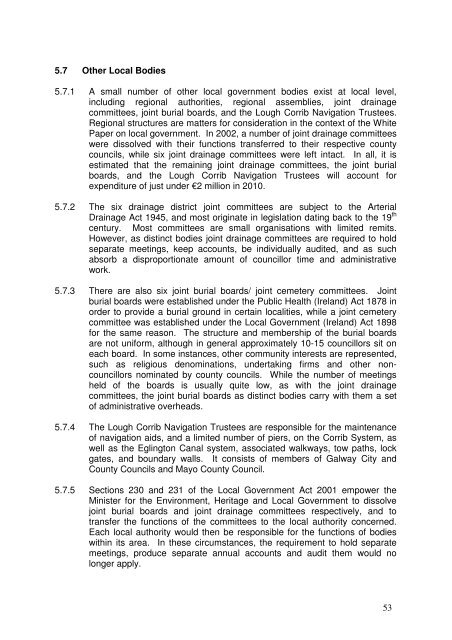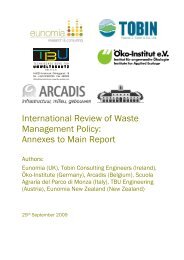Report of the Local Government Efficiency Review Group
Report of the Local Government Efficiency Review Group
Report of the Local Government Efficiency Review Group
Create successful ePaper yourself
Turn your PDF publications into a flip-book with our unique Google optimized e-Paper software.
5.7 O<strong>the</strong>r <strong>Local</strong> Bodies<br />
5.7.1 A small number <strong>of</strong> o<strong>the</strong>r local government bodies exist at local level,<br />
including regional authorities, regional assemblies, joint drainage<br />
committees, joint burial boards, and <strong>the</strong> Lough Corrib Navigation Trustees.<br />
Regional structures are matters for consideration in <strong>the</strong> context <strong>of</strong> <strong>the</strong> White<br />
Paper on local government. In 2002, a number <strong>of</strong> joint drainage committees<br />
were dissolved with <strong>the</strong>ir functions transferred to <strong>the</strong>ir respective county<br />
councils, while six joint drainage committees were left intact. In all, it is<br />
estimated that <strong>the</strong> remaining joint drainage committees, <strong>the</strong> joint burial<br />
boards, and <strong>the</strong> Lough Corrib Navigation Trustees will account for<br />
expenditure <strong>of</strong> just under €2 million in 2010.<br />
5.7.2 The six drainage district joint committees are subject to <strong>the</strong> Arterial<br />
Drainage Act 1945, and most originate in legislation dating back to <strong>the</strong> 19 th<br />
century. Most committees are small organisations with limited remits.<br />
However, as distinct bodies joint drainage committees are required to hold<br />
separate meetings, keep accounts, be individually audited, and as such<br />
absorb a disproportionate amount <strong>of</strong> councillor time and administrative<br />
work.<br />
5.7.3 There are also six joint burial boards/ joint cemetery committees. Joint<br />
burial boards were established under <strong>the</strong> Public Health (Ireland) Act 1878 in<br />
order to provide a burial ground in certain localities, while a joint cemetery<br />
committee was established under <strong>the</strong> <strong>Local</strong> <strong>Government</strong> (Ireland) Act 1898<br />
for <strong>the</strong> same reason. The structure and membership <strong>of</strong> <strong>the</strong> burial boards<br />
are not uniform, although in general approximately 10-15 councillors sit on<br />
each board. In some instances, o<strong>the</strong>r community interests are represented,<br />
such as religious denominations, undertaking firms and o<strong>the</strong>r noncouncillors<br />
nominated by county councils. While <strong>the</strong> number <strong>of</strong> meetings<br />
held <strong>of</strong> <strong>the</strong> boards is usually quite low, as with <strong>the</strong> joint drainage<br />
committees, <strong>the</strong> joint burial boards as distinct bodies carry with <strong>the</strong>m a set<br />
<strong>of</strong> administrative overheads.<br />
5.7.4 The Lough Corrib Navigation Trustees are responsible for <strong>the</strong> maintenance<br />
<strong>of</strong> navigation aids, and a limited number <strong>of</strong> piers, on <strong>the</strong> Corrib System, as<br />
well as <strong>the</strong> Eglington Canal system, associated walkways, tow paths, lock<br />
gates, and boundary walls. It consists <strong>of</strong> members <strong>of</strong> Galway City and<br />
County Councils and Mayo County Council.<br />
5.7.5 Sections 230 and 231 <strong>of</strong> <strong>the</strong> <strong>Local</strong> <strong>Government</strong> Act 2001 empower <strong>the</strong><br />
Minister for <strong>the</strong> Environment, Heritage and <strong>Local</strong> <strong>Government</strong> to dissolve<br />
joint burial boards and joint drainage committees respectively, and to<br />
transfer <strong>the</strong> functions <strong>of</strong> <strong>the</strong> committees to <strong>the</strong> local authority concerned.<br />
Each local authority would <strong>the</strong>n be responsible for <strong>the</strong> functions <strong>of</strong> bodies<br />
within its area. In <strong>the</strong>se circumstances, <strong>the</strong> requirement to hold separate<br />
meetings, produce separate annual accounts and audit <strong>the</strong>m would no<br />
longer apply.<br />
53
















